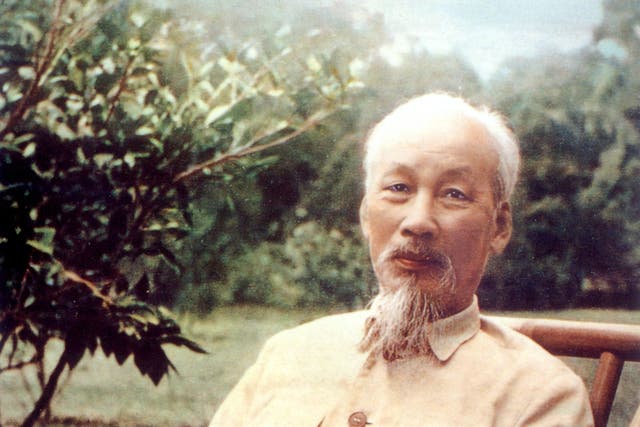

Ho Chi Minh first emerged as an outspoken voice for Vietnamese independence while living as a young man in France during World War I. Inspired by the Bolshevik Revolution, he joined the Communist Party and traveled to the Soviet Union. He helped found the Indochinese Communist Party in 1930 and the League for the Independence of Vietnam, or Viet Minh, in 1941. At World War II’s end, Viet Minh forces seized the northern Vietnamese city of Hanoi and declared a Democratic State of Vietnam (or North Vietnam) with Ho as president. Known as “Uncle Ho,” he would serve in that position for the next 25 years, becoming a symbol of Vietnam’s struggle for unification during a long and costly conflict with the strongly anti-Communist regime in South Vietnam and its powerful ally, the United States.
Ho Chi Minh was born Nguyen Sinh Cung on May 19, 1890, in a village in central Vietnam (then part of French Indochina) in Nghe province to Hoang Thi Loan, his mother, and Nguyen Sinh Sac. Ho attended the National Academy in Hue before being expelled for protesting against emperor Bao Dai and French influence in Indochina. In 1911, he found work as a cook on a French steamer and spent the next several years at sea, traveling to Africa, the United States and Britain, among other locations.
By 1919, he was living in France, where he organized a group of Vietnamese immigrants and petitioned delegates at the Versailles Peace Conference to demand that the French colonial government in Indochina grant the same rights to its subjects as it did to its rulers.
Ho Chi MinhInspired by the success of Vladimir Lenin’s Bolshevik Revolution, he joined the new French Communist Party in 1920 and traveled to Moscow three years later. He soon began recruiting members of a Vietnamese nationalist movement that would form the basis of the Indochinese Communist Party (founded in Hong Kong in 1930) and traveled the world, including Brussels, Paris and Siam (now Thailand), where he worked as a representative of the Communist International organization.
When Germany defeated France in 1940, during World War II, Ho saw it as an opportunity for the Vietnamese nationalist cause. Around this time, he began to use the name Ho Chi Minh (roughly translated as “Bringer of Light”). With his lieutenants Vo Nguyen Giap and Pham Van Dong, Ho returned to Vietnam in January 1941 and organized the Viet Minh, or League for the Independence of Vietnam. Forced to seek China’s aid for the new organization, Ho was imprisoned for 18 months by Chiang Kai-Shek’s anti-Communist government.
With the Allied victory in 1945, Japanese forces withdrew from Vietnam, leaving the French-educated Emperor Bao Dai in control of an independent Vietnam. Led by Vo Nguyen Giap, Viet Minh forces seized the northern city of Hanoi and declared a Democratic State of Vietnam (known commonly as North Vietnam, or the Democratic Republic of Vietnam) with Ho as president. Bao Dai abdicated in favor of the revolution, but French military troops gained control of southern Vietnam, including Saigon, and Chiang Kai-Shek’s Chinese forces moved into the north according to the terms of an Allied agreement. Ho began negotiations with the French in efforts to achieve a Chinese withdrawal as well as eventual French recognition of Vietnam’s independence and reunification of North and South Vietnam. But in October 1946, a French cruiser opened fire on the town of Haiphong after a clash between French and Vietnamese soldiers. Despite Ho’s best efforts to maintain peace, his more militant followers called for war, which broke out that December.
Following months of secret U.S. bombings on Communist bases, American ground troops were deployed to northern Cambodia on April 28, 1970.
American bombers dropped more than 2 million tons of bombs over the country as part of a covert attempt to wrest power from communist forces.
The conflict in Vietnam ended in 1975 with the largest helicopter evacuation of its kind in history.
On April 29, 1975, “White Christmas” played from radios across Saigon, the signal for Americans to evacuate the capitol. Seven thousand people, mainly Americans and South Vietnamese, were evacuated from the city. Photos of the chaos in the streets as men, women and children jostled for space on the last helicopters was broadcast across the world.
On April 30, 1975, the last few Americans still in South Vietnam were airlifted out of the country as Saigon fell to communist forces. North Vietnamese Colonel Bui Tin, accepting the surrender of South Vietnam later in the day, remarked, “You have nothing to fear; between Vietnamese there are no victors and no vanquished. Only the Americans have been defeated.” That day, Saigon was renamed Ho Chi Minh City.
The Vietnam War was the longest and most unpopular foreign war in U.S. history and cost 58,000 American lives and as many as two million Vietnamese soldiers and civilians were killed.
HISTORY.com works with a wide range of writers and editors to create accurate and informative content. All articles are regularly reviewed and updated by the HISTORY.com team. Articles with the “HISTORY.com Editors” byline have been written or edited by the HISTORY.com editors, including Amanda Onion, Missy Sullivan, Matt Mullen and Christian Zapata.